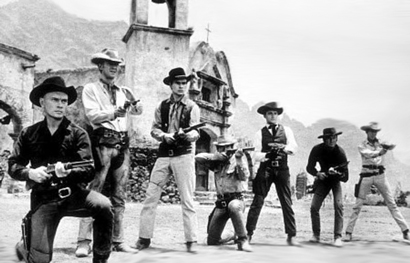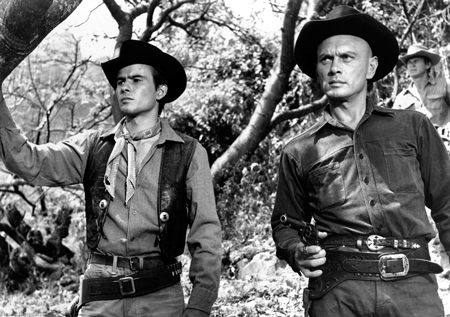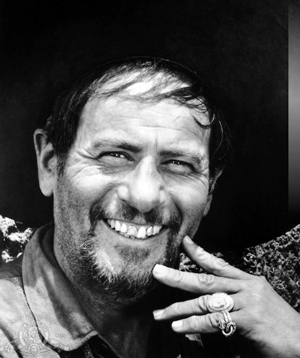
 |
|
|
|
Well, better late than never: this 50th Anniversary disc of John Sturges' The Magnificent Seven should really be a 51st anniversary show. Consumers are not likely to gripe, however, as this handsome HD disc has all the extras of the previous 2006 DVD special edition and sells for 33% less. If you're not a fan of class-A westerns the time is ripe to find out what the genre is all about: most of the essential titles are out on DVD and Blu-ray. John Carpenter said it straight: The Magnificent Seven is neither the best nor the most meaningful of the great Westerns, but it's possibly the most fun. After a slow start in theaters, this United Artists evergreen became one of the most popular television movies ever. It has remained a genre high point for its clean action, snappy script and wonderful music score. 
The film's storyline is the quintessential "Kennedy Western". A peasant village in Northern Mexico wants to buy Yankee guns to ward off the predatory bandit chieftain Calvera (Eli Wallach) but instead hires the unemployed American gunslinger Chris (Yul Brynner), just in from Dodge City. Chris recruits six more out-of work gun hands. For twenty dollars in pay plus room & board the seven mosey South of the Rio Grande to face down Calvera's forty thieves. The Magnificent Seven is packed with action excitement and blessed with a music score that makes one stand up and take notice. It has been a favorite of schoolboys for half a century, and during the 1960s it was the ultimate gun-down epic. Steve McQueen fanned his .45 Colt with such flamboyance that nobody cared that a frame-by-frame study reveals that some of his shots appear to go way off target. In his initial quick-draw in the long-withheld first gunfight with Calvera's men, McQueen's first bullet goes right into the ground, if not through his big toe. The Magnificent Seven is the epic with the squeaky clean Mexican peons, including the guy who played Donna Reed's gardener on her TV show. Russian Vladimir Sokoloff pulls prime duty as the Mexican wise man. The alluring Rosenda Monteros (so sexy in the later She and Tiara Tahiti) bats her dark eyes at Horst Buchholz, she almost makes him seem Mexican. Everybody loves the five subordinate members of Yul Brynner's insurgent team, each with one character note to play. The only flaw with the show is that it must stay the same. Like many favorites, we wish that it could magically change to give us additional adventures with this ultra-slick pack of Yankee pistoleros. Everyone measures The Magnificent Seven against its model Seven Samurai, when there isn't really any comparison: one film is a finely crafted entertainment and the other a world masterpiece. Japanese critics grumbled that Kurosawa's fantasy was too American, what with its anachronistic 'dialogue' between the peasant farmer and samurai classes. The John Sturges remake is the perfect John Kennedy fantasy because it proposes a liberal foreign policy of armed intervention. American know-how and firepower reaches out to other nations with a sterling example and a lot of guns, rids them of their oppressors and earns their eternal gratitude. Kennedy encouraged the notion that Americans with guns cross the border for idealistic, unselfish reasons. The gunslingers of The Magnificent Seven predict Kennedy's promotion of the Peace Corps and the Green Berets. Although the script pays lip service to the dignity of the Mexican peasants, Yul Brynner's statement that "Only the farmers win" is a bunch of hooey. The farmers win? Forget the farmers! We identify with the ultra-cool, narcissistic gunfighters, the dudes with the macho attitudes and designer threads. The finish does not find them standing forlornly over the graves of their fallen comrades, as did Kurosawa's samurai. At the fade out our surviving heroes ride away with triumphant music lighting the way to new adventures. Their dead comrades will have songs sung over their graves -- they're legends and superheroes, whereas the dirt farmers remain clueless squares. This fairy tale of mercenaries elevated and transformed by a noble cause is not an outgrowth of the 'adult psychological' western of the '50s, but a new kind of western where history (even John Ford's history) is irrelevant. In its place is exalted the trappings of style and affectation and the worship of professional prowess. Yul Brynner struts like a peacock, Steve McQueen acts alternately coy and petulant and Robert Vaughn broods and whines. Charles Bronson is the sour hard-ass and James Coburn does a Zen act. Poor Brad Dexter unfortunately thinks he's in a movie from the '40s while German import Horst Buchholz has fun playing Roy Rogers. After four solid years of television packed with oaters fixated on shootin'-iron talents, the western had finally reached the stage where the star's basic job was to be a mobile weapons platform, in boots. 
The Magnificent Seven is extremely well directed by John Sturges, an 'outdoor' director adept at keeping his heroes laconic and on task. Most any setup could be hung on the wall as a painting: when action happens, it's fast, motivated and convincing. Most of the film's stars were fresh from combat in the trenches of TV and low-budget films. They knew intuitively how to steal scenes and hold the camera's attention. Part of the movie's success is that the half-dozen completely incompatible acting styles on view never get a chance to clash: each actor is emoting in his separate, egotistical little world. The wonderful bandit played by Eli Wallach is the only character with a genuine personality... and he out-thesps the whole bunch of 'em. MGM's Blu-ray of The Magnificent Seven will bowl over fans of this movie; it looks even better than the slightly compressed HD version shown on the MGMHD channel. With their clear exterior shots, westerns demonstrate the superiority of the Blu-ray format's heightened resolution, wider range of contrast and rock-steady images. Until the latest digital color manipulation technology came into use, this title looked pretty drab, with a color range of 4 shades of brown. Now the hues pop. If not back to 100% of their original values, they look far too healthy to complain about. What DVD owners will find is a show with a new texture. The ground haze in the Acapulco-adjacent locations is now evident, and the distant hillsides are slightly subdued instead of simply looking out of focus. When the horses raise dust, the effect is now an enhanced impression of depth. The extra detail is stunning. We can now see that Eli Wallach's red silk shirt contains a pattern of more shiny material. Before, that red shirt bled like a red ink smear. The Dolby Digital 5.1 remix is track is also available in Spanish, along with the original mono English track. Owners wishing to view the movie in French are advised to hang on to the older DVD because that option has been dropped, along with French subtitles. Subs remain present in English and Spanish. 
MGM has included most of the extras that this title has accumulated over the past ten years of DVD releases, most of which were produced by Michael Arick. An entertaining audio commentary from 2001 features producer Walter Mirisch (who is proud as pumpkins over his goldmine of a movie), a jovial James Coburn, the youthful-sounding Eli Wallach, and assistant director (and later Steve McQueen producing partner) Robert Relyea. The track is an easy listen, doesn't bog down in detail and offers a constantly changing set of viewpoints and anecdotes on the making of the film. The 2006 disc included a fine commentary by film expert and western authority Sir Christopher Frayling, recorded at considerable expense in England. MGM has either forgotten this extra or chosen not to include it. Most of the other extras are in standard def. Guns for Hire is a 46-minute reworking of a fine show produced for the BBC in 2000. More details on it can be read in the Savant review of the 2001 Magnificent Seven DVD. Christopher Frayling on The Magnificent Seven allows the author/expert to present his thoughts on the film in a docu format, analyzing the characters and expanding on his political interpretation. For Elmer Bernstein and The Magnificent Seven, music professor and soundtrack historian Jon Burlingame profiles the late composer and examines his lively, Aaron Copland- inspired music themes. The Linen Book: Lost Images from The Magnificent Seven uses the thousands of original set stills as a springboard for Robert Relyea and Eli Wallach to once again wax nostalgic with stories from the filming. A photo gallery is present along with two original theatrical trailers that went missing on the 2006 disc. The first trailer is a corny embarrassment organized around a terrible song. Just that trailer alone can account for why the film opened poorly in its first release.
On a scale of Excellent, Good, Fair, and Poor,
The Magnificent Seven Blu-ray rates:
Reviews on the Savant main site have additional credits information and are often updated and annotated with reader input and graphics. Also, don't forget the 2011 Savant Wish List. T'was Ever Thus.
Review Staff | About DVD Talk | Newsletter Subscribe | Join DVD Talk Forum |
| ||||||||||||||||||